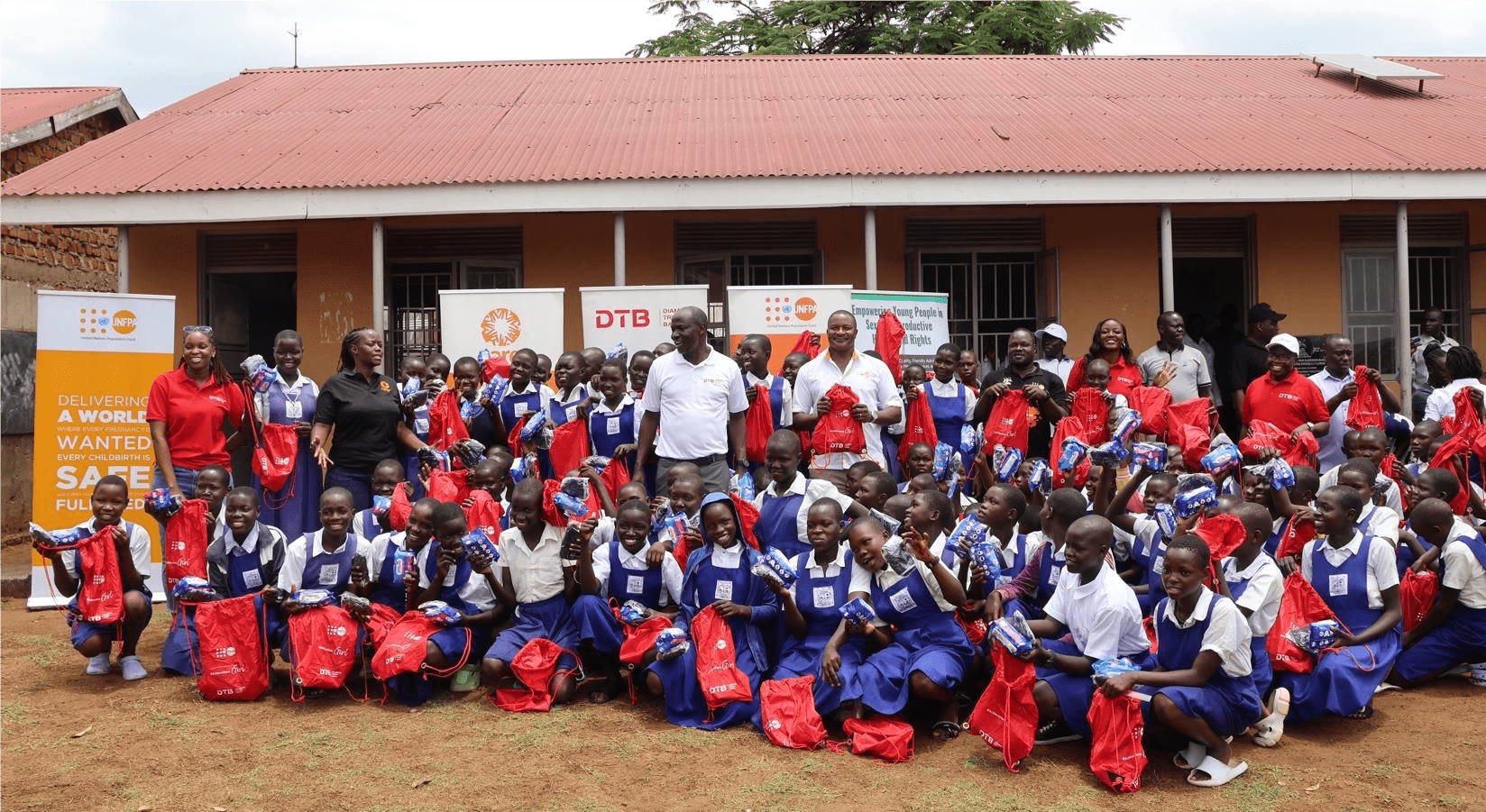In a joint effort to promote menstrual health and reduce school absenteeism among adolescent girls, Diamond Trust Bank (DTB), the United Nations Population Fund (UNFPA), and it’s implementing partners, Naguru Teenage Centre and CARE, has distributed reusable sanitary pads to pupils at Lefori Primary School in Moyo District on March 2, 2025. The event was held under the “Achievemoregirls” initiative, part of the Danish Embassy-funded SAY Programme, which focuses on sexual and reproductive health and rights (SRHR) and gender-based violence (GBV) awareness.
During the event, Mrs. Jesca Ongieretho, Chief Administrative Officer of Moyo District, lauded the long-standing collaboration between UNFPA and the district through Naguru Teenage Centre and CARE.
“Teenage pregnancy and girl-child education are still major challenges. The education completion rate for the girl child is still low,” she said. “I believe providing sanitary pads will greatly contribute to reducing school drop-out rates and improving school completion.”
She also thanked DTB for their corporate contribution and pledged continued support:
“We appreciate Diamond Trust Bank for their partnership with UNFPA and the district authority. We pledge technical support and an open door for partner programs.”
Mr. Mali Michael, District Education Officer of Moyo, emphasized the positive outcomes of the partnership:
“Most adolescents are in primary schools, and we need to empower teachers and health clubs which are very helpful for them. The sanitary pads have improved school completion among girls. The district completion rate has increased from 28.1% in 2022 to 41.8% in 2024.”
Meanwhile, Dr. Michael Adrawa, Assistant District Health Officer in charge of maternal and child health, proposed expanding the initiative:
“We need a comprehensive package of menstrual hygiene education beyond just pad distribution and more engagement of parents. I also recommend conducting a mini-study to assess the program’s impact.”
The Head of Sales and Marketing at Diamond Trust Bank reaffirmed the bank’s commitment to empowering girls and women:
“We believe in supporting humanity and consider the girl child essential for the future. Fifty-six percent of our staff are women,” he stated. “By distributing sanitary pads to vulnerable girls, we are fulfilling our social corporate responsibility. The kits also include menstrual hygiene booklets and safety bags.”
Dr. Alex Chono, UNFPA Programme Coordinator West Nile region, outlined the organization’s strategic focus:
“UNFPA provides resources to Naguru Teenage Centre and CARE to implement SRHR, SGBV awareness, menstrual hygiene, and more. Our partnership with DTB is focused on reducing school dropouts.”
He added, “The SAY Programme aims to support 56 schools and 12 health facilities in Moyo District.”
The Head Teacher of Lefori Primary School acknowledged the impact of the initiative:
“Your support has revitalized our school’s health and sanitation clubs and helped disseminate knowledge on menstrual hygiene. However, we still face challenges such as limited water access, lack of safe rooms for girls, and insufficient parental involvement.”
Mr. Charles Angupi, In-Charge of Lefori Health Centre III, highlighted improvements and ongoing needs:
“Lefori sub-county previously led in teenage pregnancy, but the SAY Programme has helped reduce this by creating youth-friendly corners,” he said.
“Health workers have been trained to provide adolescent services and conduct school health outreaches, including training girls to make reusable sanitary pads.”
He added, “Our challenges include limited space for youth-friendly corners, lack of materials, and inadequate peer educators. We need to build a modern adolescent youth corner and provide local-language IEC materials on TV screens.”
Voices from Adolescents
Beneficiaries of the SAY Programme shared that they now feel empowered to seek help:
“We used to fear visiting health facilities, but with the help of peer educators and health workers, we now feel confident to ask questions about menstrual hygiene, family planning, and SRHR,” one student said.
However, they also voiced a concern:
“The youth-friendly corner is small and hidden. It should be relocated to a more open and accessible place.”
Recommendations
In a joint resolution, the local government authorities, UNFPA, Diamond Trust Bank, and the implementing partners of the SAY Programme—Naguru Teenage Centre and CARE—outlined several action points and called upon all stakeholders to collaborate in efforts to reduce school absenteeism among adolescent girls.
Diamond Trust Bank committed to providing quarterly consignments of sanitary kits to UNFPA for distribution, visiting beneficiary schools, and documenting the outcomes.
The SAY Programme implementing partners—Naguru Teenage Centre and CARE—were tasked with addressing key issues raised during the activity. These include scaling up the training of in- and out-of-school girls in the production of reusable sanitary pads and enhancing menstrual hygiene and management education.
Additionally, Naguru Teenage Centre and CARE were urged to support health facilities with tents as a short-term solution for those without adolescent-friendly corners, while awaiting long-term infrastructure development to create appropriate, safe spaces for adolescents.








